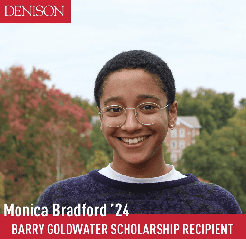Kelvin Do, Staff Writer—
Monica Bradford ‘24 has been awarded the 2023 Goldwater Scholarship, a highly esteemed award that recognizes undergraduate students with exceptional academic and research credentials. Bradford, who is a Chemistry major, was selected from a pool of 5,000 natural science, engineering and mathematics students nominated by 427 academic institutions across the United States. The award provides a $7,500 stipend to assist with tuition and fees for the upcoming academic year.
Established by Congress in 1986, the scholarship program honors Senator Barry Goldwater and aims to support a new generation of highly qualified scientists, mathematicians and engineers. The scholarship is open to U.S. citizens and permanent residents who plan to pursue careers in these fields. To be eligible for the scholarship, students must submit an application that includes college transcripts, a list of activities, a research article or proposal, a personal statement and three letters of recommendation from their institution’s faculty.
Bradford, who aspires to tackle health disparities through science, conducts research in the creation of organic semiconductors.
Her research focuses on synthesizing donors for the creation of donor-acceptor, columnar, and liquid crystal molecules that can emit light and exchange energy in a process called charge transfer. These molecules have the potential for use in solar cells or medical imaging devices like X-rays. Bradford hopes to develop molecules that can absorb near-infrared light for medical imaging or molecules that have a greater capacity to store energy from the sun for solar cells.
“This project is really something that could be great because if I can develop molecules or make medical imaging technology that is easy to make and cheap, by reducing the cost of materials, the cost of medical devices will also decrease, making them more accessible to those who need them,” Bradford said.
In the future, Bradford plans to pursue a Ph.D. in immunology or biomedical engineering to continue her study and research to solve global health disparities. “That’s why I love science because you can do things, you can make things happen.”

